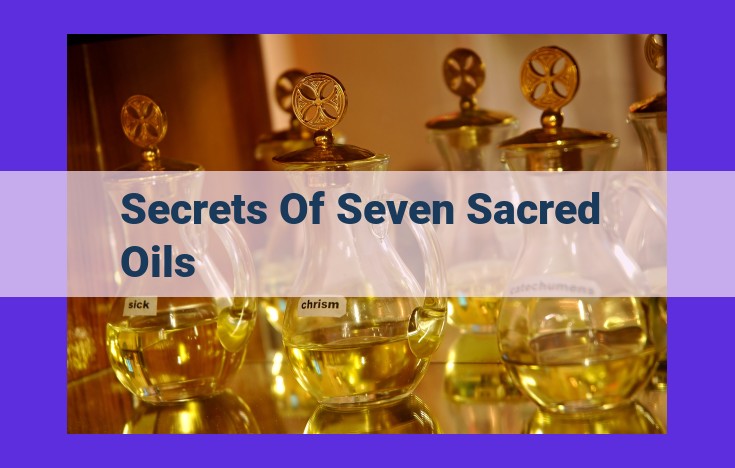- Seven Sacred Oils: Unlocking Ancient Secrets
- Explore the ancient practice of anointing with sacred oils rooted in biblical tradition.
-
Tracing the Origins of Anointing Rituals
- Discover the origins of anointing in ancient Egypt, Israel, and biblical history.
-
Biblical Blueprint: The Seven Sacred Oils
- Outline the scriptural passages that describe the use and significance of the seven sacred oils.
-
Practical Applications: Unveiling the Powers
- Explore the various uses of the oils, including anointing, healing, consecration, purification, and protection.
-
Experiencing the Benefits: Spiritual and Physical
- Describe the spiritual, physical, emotional, and protective benefits of using sacred oils.
-
Cautions and Considerations
- Discuss potential dangers of misuse, improper application, allergic reactions, and interactions with medications.
-
Sacred Ways of Use: Traditional and Modern
- Explain the traditional method of anointing and explore modern methods such as diffusing, inhaling, and topical application.
-
Sourcing the Sacred Oils: Where to Find Them
- Provide information on where to find the seven sacred oils, including health food stores, online retailers, and specialty shops.
Seven Sacred Oils: Unlocking Ancient Secrets
Throughout history, certain oils have been revered as sacred, possessing profound spiritual significance and therapeutic properties. Join us on a journey to uncover the secrets of the Seven Sacred Oils, tracing their origins, exploring their biblical foundations, and unveiling their practical applications.
Historical Significance
The concept of sacred oils dates back to ancient civilizations. In Egypt, oils were used for religious rituals and embalming. In Israel, anointing with oil became a sacred practice, symbolizing consecration and God’s blessings. Throughout the Bible, references to these oils provide a glimpse into their profound impact on religious and cultural traditions.
Biblical Foundation
In the Exodus 30:22-33, God instructed Moses to create a holy anointing oil for consecrating priests, the Tabernacle, and its vessels. This oil contained seven specific ingredients: myrrh, cinnamon, sweet calamus, cassia, olive oil, and onycha. Each ingredient carried symbolic meaning, representing various aspects of spirituality and divine favor.
Practical Applications
Beyond their religious significance, sacred oils were also used for practical purposes. They were employed for healing, as antiseptics, for consecrating objects, and purifying rituals. Their aromatic properties provided emotional and spiritual upliftment, creating a sense of connection with the divine.
Experiencing the Benefits
Using sacred oils today brings spiritual, physical, emotional, and protective benefits. They can enhance prayer, meditation, and spiritual experiences. Their therapeutic properties soothe the body, reduce stress, boost immunity, and promote overall well-being. Additionally, they offer protection against negative energies and influences.
Cautions and Considerations
While sacred oils can be powerful remedies, it’s essential to use them cautiously. Some oils can cause allergic reactions, interact with medications, or be toxic if ingested. Always consult a qualified aromatherapist or healthcare professional before using essential oils, especially if you have underlying health conditions.
Tracing the Origins of Anointing Rituals
Ancient Egypt: The Birth of Sacred Anointing
Anointing rituals have a rich history, tracing their origins to ancient Egypt. Egyptians believed that anointing with perfumed oils not only cleansed and purified the body but also connected them with the divine. Pharaohs and priests underwent elaborate anointing ceremonies to symbolize their connection to the gods and their authority to rule.
Israel: Anointing in the Covenant
In the ancient Israelite tradition, anointing played a crucial role in the covenant relationship between God and his people. Prophets, priests, and kings were anointed with holy oil as a sign of their consecration to God’s service. These anointed individuals were set apart and empowered to represent God among the people.
Biblical History: The Anointing of Jesus
The culmination of anointing practices in biblical history came with the anointing of Jesus. Prophetically foretold in the Old Testament, Jesus was anointed by John the Baptist with holy spirit and power. This anointing marked him as the Messiah, the Savior of the world. Through Jesus, the promise of God’s presence and authority would be manifested to all who believed.
Biblical Blueprint: The Seven Sacred Oils
Unlocking the Anointed Word
Throughout Scripture, the use of sacred oils holds profound significance, symbolizing God’s presence and blessing. In the Old Testament, we find detailed accounts of seven specific oils used for sacred purposes. Each oil carried unique characteristics and was prescribed for different applications.
Anointing with Oil: A Divine Practice
The practice of anointing with oil was not merely ceremonial but held deep spiritual meaning. It represented God’s anointing of individuals for specific roles or tasks. In Exodus 28:41, we read about the anointing of Aaron and his sons as priests: “You shall anoint them and consecrate them, that they may serve me as priests.” Similarly, in 1 Samuel 16:12, Samuel anoints David as king of Israel, fulfilling God’s purpose.
The Seven Sacred Oils: Their Biblical Foundation
The Bible mentions seven sacred oils in various passages, each with its own distinctive purpose:
- Holy Anointing Oil (Exodus 30:22-33): Used for anointing the tabernacle, its vessels, and the priests. It symbolized the presence and guidance of God.
- Frankincense Oil (Exodus 30:34-38): Incorporated into incense used for worship in the tabernacle. Its fragrance represented prayers ascending to God.
- Myrrh Oil (Exodus 30:23-25): Included in the holy anointing oil. It signified embalming and purification, as well as God’s protection.
- Cassia Oil (Exodus 30:24-25): Used in the holy anointing oil. It symbolized strength and healing.
- Cinnamon Oil (Exodus 30:23-25): Also found in the holy anointing oil. It represented warmth, comfort, and joy.
- Olive Oil (Exodus 27:20-21): Used for fueling the lamps in the tabernacle. It represented the Holy Spirit and illumination.
- Hyssop Oil (Numbers 19:6, 17-18): Made from the hyssop plant. It was used for purification rituals, symbolizing cleansing from sin.
Practical Applications: Unveiling the Powers of Sacred Oils
Throughout history, sacred oils have been revered for their extraordinary powers. They were used in ancient rituals for anointing, healing, consecration, purification, and protection. The Bible sheds light on seven sacred oils that hold immense significance.
Anointing: A Symbol of Divine Empowerment
Anointing with sacred oils has been practiced across cultures for centuries. In biblical times, priests, prophets, and kings were anointed to signify their divine calling. The anointing oil symbolized the bestowal of God’s power and favor upon them.
Healing: Balm for Body and Soul
Sacred oils have been used for medicinal purposes since ancient times. Myrrh, for example, has antibacterial and anti-inflammatory properties, while frankincense promotes relaxation and reduces stress. These oils are believed to promote physical healing, as well as provide comfort and tranquility for the soul.
Consecration: Setting Apart for Sacred Use
Sacred oils were used to consecrate objects and spaces for religious purposes. Temples, altars, and other sacred items were anointed with oils to make them dedicated to God. This consecration signified that these objects were set apart for holy use.
Purification: Cleansing for Spiritual Transformation
Sacred oils were also used for purification rituals. They were believed to remove impurities and restore spiritual well-being. In the Bible, the Levitical priests were instructed to use sacred oils to purify themselves before performing temple duties.
Protection: A Shield Against Evil
Sacred oils have been used for protection against evil forces. Myrrh and frankincense were burned as incense to ward off negativity and create a sacred atmosphere. Oils of lavender and cedarwood are believed to promote peace, tranquility, and protection during times of turmoil.
Experiencing the Transformative Power: Sacred Oils’ Spiritual and Physical Benefits
In the realm of ancient rituals and sacred practices, sacred oils hold a profound allure, offering a gateway to multifaceted transformations. These ethereal elixirs have been revered throughout history for their ability to unlock spiritual depths, heal physical ailments, and safeguard against negative energies.
Spiritual Renewal and Elevation:
Immerse yourself in the aromatic embrace of sacred oils, and feel your spirit soar. They ignite a divine spark, fostering inner peace and harmony. The gentle scent of myrrh calms the mind, bringing clarity and focus while frankincense elevates consciousness, connecting you to a higher power.
Physical Well-being and Healing:
Sacred oils are veritable healers, alleviating pain and promoting overall wellness. Lavender’s calming properties soothe headaches and sleeplessness, while rosemary invigorates the body, reducing inflammation and boosting circulation. Eucalyptus, with its expectorant qualities, clears congestion, easing respiratory ailments.
Emotional Balance and Healing:
The therapeutic powers of sacred oils extend to the emotional realm, easing anxiety and depression. Bergamot’s uplifting aroma brightens your mood, while chamomile’s calming embrace alleviates stress and promotes relaxation. Sandalwood, with its grounding properties, stabilizes emotions and fosters a sense of inner peace.
Protective Barrier Against Negative Energies:
In the face of adversity, sacred oils stand as your steadfast guardians. Cedarwood’s protective properties shield against psychic attacks, while hyssop’s purifying qualities remove negativity from your environment. Frankincense, the “holy incense,” creates a sacred space, repelling evil spirits and promoting spiritual protection.
Cautions and Considerations: Handling Sacred Oils with Care
While sacred oils offer immense benefits, their potency demands responsible use. Misuse or improper application can lead to adverse effects. Allergic reactions and skin irritation are possible, especially for those with sensitive skin. Patch testing on a small area before widespread use is highly recommended.
Interactions with medications should also be considered. Some oils can interfere with the metabolism or effects of certain drugs. Consulting with a healthcare professional or certified aromatherapist before using sacred oils while on medication is crucial.
Moreover, overuse can diminish the oils’ effectiveness and potentially lead to undesirable outcomes. Following recommended guidelines and using the oils in moderation is essential for optimal benefits.
Storage and Handling
Proper storage is paramount to maintain the potency and quality of sacred oils. Keep them in dark, cool places away from direct sunlight and heat. Airtight containers prevent oxidation and preserve their aromatic compounds.
Seek Guidance
If you’re new to using sacred oils or have any concerns, it’s wise to seek guidance from a qualified aromatherapist or healthcare professional. They can provide personalized advice based on your individual needs and ensure safe and effective use.
Sacred Ways of Use: Bridging Traditions with Modernity
Since ancient times, sacred oils have played a profound role in spiritual and holistic practices. Their divine essence has been harnessed through traditional anointing rituals, connecting us to a legacy that transcends generations.
Traditional Anointing: A Sacred Ceremony
The traditional method of anointing involves gently applying the oil onto the forehead, temples, and other areas of the body. This practice signifies a spiritual connection, blessings, and consecration. It is believed that the oil becomes a vessel through which divine energy flows, bringing healing, protection, and guidance.
Modern Techniques: Embracing Innovation
While traditional anointing remains a cornerstone of many spiritual practices, modern techniques have emerged to enhance the accessibility and diversity of oil usage.
-
Diffusing: Releasing the aromatic essence of the oils into the air through a diffuser creates a soothing and uplifting atmosphere. This method is ideal for purification, mood enhancement, and stress relief.
-
Inhaling: Directly inhaling the oils provides a concentrated experience of their therapeutic benefits. It can alleviate respiratory issues, boost alertness, and clear congestion.
-
Topical Application: Applying the oils directly to the skin offers localized benefits. Diluted with a carrier oil, they can be used for massage, treating skin conditions, and reducing inflammation.
Benefits of Sacred Oils: Mind, Body, and Spirit
Regardless of the method of use, sacred oils offer profound benefits for our well-being:
-
Spiritual: They facilitate a connection with the divine, promote meditation, and enhance spiritual growth.
-
Physical: Their therapeutic properties aid in healing, boost immunity, and alleviate pain.
-
Emotional: They uplift the spirit, calm anxiety, and promote a sense of peace and well-being.
Sourcing Sacred Oils: With Care and Respect
To ensure the authenticity and purity of your sacred oils, consider sourcing them from reputable health food stores, online retailers, or specialty shops. Look for products that are certified organic or wild-crafted.
Sourcing the Sacred Oils: A Journey to Ancient Traditions
In the realm of sacred oils, where ancient wisdom meets modern well-being, finding the purest and most potent oils is paramount. As you embark on your journey to unlock the secrets of these sacred elixirs, let’s explore the places where they can be found.
Health Food Stores: A Haven of Natural Remedies
Nestled within bustling cities and quaint towns alike, health food stores are treasure troves for those seeking holistic healing. Their shelves are adorned with an array of natural products, including a wide selection of sacred oils. These stores are often staffed by knowledgeable individuals who can guide you in choosing the right oils for your specific needs.
Online Retailers: Convenience at Your Fingertips
In the digital age, the world’s finest oils are just a click away. Myriad online retailers offer a vast selection of sacred oils, allowing you to browse and compare products from the comfort of your home. However, it’s crucial to research reputable vendors and read customer reviews to ensure you’re purchasing genuine and authentic oils.
Specialty Shops: Guardians of Ancient Craftsmanship
For a truly immersive experience, visit specialty shops dedicated to ancient arts and traditions. These establishments often stock meticulously crafted sacred oils, made by artisans who have dedicated their lives to preserving time-honored practices. These shops not only offer a rich variety of oils but also provide a wealth of knowledge and insights into the sacred use of these elixirs.
As you embark on this journey, remember that sourcing the sacred oils is a significant step in unlocking their ancient powers. By choosing reputable sources, you can ensure that you’re receiving the highest quality oils that resonate with the wisdom and traditions of the past. May these sacred elixirs empower you on your path to spiritual and physical well-being.




